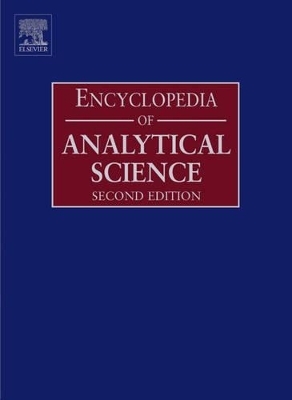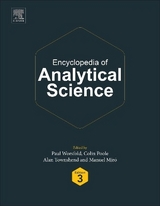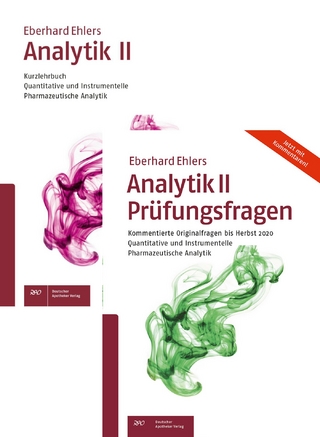
Encyclopedia of Analytical Science
Elsevier Science Publishing Co Inc
978-0-12-764100-3 (ISBN)
- Titel erscheint in neuer Auflage
- Artikel merken
As with the first edition of the Encyclopedia of Analytical Science, Second Edition is designed to provide a detailed and comprehensive publication covering all facets of the science and practice of analysis. The new work has been extensively revised in terms of the titles and content of the first edition, and includes comprehensive coverage of techniques used for the determination of specific elements, compounds and groups of compounds, in physical or biological matrices. It addresses applications of chemical analysis in all areas, ranging from such topics as medicine to environmental science, and geology to food science. Important characterisation techniques, such as microscopy and surface analysis are also included.
The complete work consists of around 610 articles, each consisting of about 4000 words, figures and summary tables. These articles are combined to form larger entries providing comprehensive coverage of important topics and assisting the reader in locating material of interest. The entries are arranged in an A to Z format providing a final publication of about two and a half million words in ten volumes. The articles are structured to allow easy access to information on specific analytes, instrumental techniques and sample matrices. There is extensive cross-referencing throughout the Encyclopedia and a detailed index.
Also available online via ScienceDirect – featuring extensive browsing, searching, and internal cross-referencing between articles in the work, plus dynamic linking to journal articles and abstract databases, making navigation flexible and easy. For more information, pricing options and availability visit www.info.sciencedirect.com.
Paul Worsfold is currently Professor of Analytical Science in the School of Earth, Ocean and Environmental Sciences and Director of the Plymouth Environmental Research Centre at the University of Plymouth. He was an undergraduate at Loughborough University where he also gained industrial experience in Germany and the Netherlands. He obtained an MSc (1978) and a PhD (1980) in Bioanalytical Chemistry with Michael Thompson at the University of Toronto, Canada. A postdoctoral position with Jarda Ruzicka and Elo Hansen at the Technical University of Denmark was followed by lectureships in Sheffield (now Hallam) and Hull (a new blood lectureship working with Alan Townshend) and a chair at Plymouth in 1990. He received his DSc from Loughborough in 1998. His research activities are at the interface of Analytical Chemistry and Environmental Science and he is a member of the 'Biogeochemistry and Environmental Analytical Chemistry' research group at Plymouth. His core Analytical Chemistry research interests are flow injection techniques, molecular spectroscopy (particularly chemiluminescence), instrument design, on-line sample treatment techniques and field flow fractionation. Environmental interests include oceanic scale spatial mapping of trace metal micronutrients, e.g. iron, nutrient (N and P) cycling in natural waters, physico-chemical speciation of elements and contaminant transport and modelling. He has published over 200 scientific research papers and review articles. He is currently Editor of the journal Analytica Chimica Acta and Editor of the Encyclopaedia of Analytical Science. He is also on the Editorial Boards of the Journal of Flow Injection Analysis and Environmental Chemistry. His work has been recognised by the award of the SAC Silver Medal in 1990, the H.E. Armstrong lectureship (SCI) in 1992, the C.B. Huggins lectureship (Acadia University) in 1997 and the Theophilus Redwood lectureship (RSC) in 2000. He became President of the Analytical Divis Alan Townshend holds B.Sc., Ph.D.and D.Sc degrees from the University of Birmingham, where he lectured in analytical chemistry from 1964 to 1980. He moved to the University of Hull in 1980, where he introduced both analytical chemistry and toxicology as degree subjects. He became Professor of Analytical Chemistry in 1984 and later held the G. F. Grant Chair of Chemistry and served as Dean. He became Director of the institute for Chemistry in Industry in c.2000 and retired from the University in 2004. He has published five books and edited numerous others. He has also published more than 300 scientific papers, his main interests initially being flame spectroscopy and, from about 1978 onwards, analytical applications of chemiluminescence and of immobilised reagents (especially enzymes), and flow injection analysis. Professor Townshend was a senior editor of Analytica Chimica Acta (Elsevier) until 2006 and of the Dictionary of Analytical Reagents (Chapman and Hall, 1993). He has been an Editor of all three editions of the Encyclopedia of Analytical Science. He was President of the Analytical Division of the Royal Society of Chemistry (RSC) in 1996-98 and has served on several of its committees. He was an active member of the Analytical Chemistry Division of the International Union of Pure and Applied Chemistry for many years. He also was a member of the Council of the Analytical Chemistry Division of the Federation of European Chemical Societies for four years. His interests in forensic science and toxicology led to appointments to bodies governing the competence of forensic scientists and the verification of anti-doping tests in horse racing. He also served on the Chemistry panels of the Higher Education Council’s Research Assessment and Teaching Quality exercises. After retirement, Emeritus Professor Townshend successfully completed a part-time BA course in Archaeology (2006 – 13) at the University of Hull. He is now involved in genealogy with help from the University of the Third Age (U3A) and also organises wine appreciation meetings for the local U3A branch. Colin F. Poole, Department of Chemistry, Wayne State University, Detroit, MI, USA
Activation analysis. Adhesives and Sealants. Air analysis. Alkaloids. Amino Acids. Amperometry. Amplification Reactions. Analytical reagents. Archaeometry and antique analysis. Arsenic (speciation). Asbestos. Atomic absorption spectrometry. Atomic emission spectrometry. Atomic fluorescence spectrometry. Atomic Mass Spectrometry. Bioassays. Bioluminescence. Bleaches and Sterilants. Blood and Plasma. Buffer Solutions. Building materials. Cadmium (speciation). Capillary Electrochromatography. Capillary Electrophoresis. Carbohydrates. Carbon. Cement. Centrifugation. Ceramics. Cerebrospinal Fluid. Chemical Warfare Agents. Chemiluminescence. Chemometrics. Chiroptical Analysis. Chlorofluorocarbons and other halocarbons. Chromatography. Clinical analysis. Coal and Coke. Colour Measurement. Computer Modelling. Conductimetry and oscillometry. Cosmetics and Toiletries. Derivatization of Analytes. Dioxins. Distillation. DNA Sequencing. Drug metabolism. Electrogravimetry. Electrolytes in physiological samples. Electron Energy Loss Spectrometry (EELS). Electron spin resonance spectroscopy. Electrophoresis. Elemental speciation. Endocrine Disrupting Chemicals. Environmental analysis. Enzymes. Essential Oils. Ethanol. Extraction. Extraction: solvent extraction. Fertilizers. Field Flow Fractionation. Fire Assay. Flow analysis. Flow injection analysis. Fluorescence. Foam Fractionation and Floatation. Food and nutritional analysis. Forensic sciences. Fourier transform techniques. Fuel. Functional group analysis. Gas chromatography. Gastric Juices. Geochemistry. Glasses. Gravimetry. Haemoglobins. Headspace analysis. Herbicides. History of Analytical Science. Hormones. Humic and Fulvic Compounds. Immunoassays. Indicators. Infrared spectroscopy. Ion. Ion exchange. Ion-selective electrodes. Isotope Dilution Analysis. Isotope Ratio Measurements. Kinetic methods. Lab-on-a-chip Technologies. Laser-based techniques. Lead. Lipids. Liquid chromatography. Mass spectrometry. Membrane. Mercury (speciation). Micellar Electrokinetic Chromatography. Micro Total Analytical Systems (&mgr;TAS). Microbiological techniques. Microelectrodes. Microscopy. Microwave Spectroscopy. Molecular Emission Cavity Analysis. Molecularly imprinted polymers. Nitric oxide: biological functions and detection. Nitrogen (speciation). Nitrosamines. Nuclear magnetic resonance spectroscopy. Nucleic acids. Optical spectroscopy. Ozone. Paints. Particle size analysis. Peptides. Perfumes. Personal Monitoring. Pesticides. pH. Pharmaceutical analysis. Pharmacokinetics. Phosphorescence. Phosphorus (speciation). Photoacoustic Spectroscopy. Pigments. Plastics. Polarography. Polychlorobiphenyls. Polycyclic aromatic hydrocarbons. Polymerase chain reaction (PCR). Polymers. Potentiometric Stripping Analysis. Precious Metals. Prions. Process analysis. Proteins. Proteins. Proteomics. Purines, pyrimidines and nucleotides. Qualitative analysis. Quality assurance. Radiochemical. Raman spectroscopy. Remote gas sensing. Sample dissolution for elemental analysis. Sample Handling. Sampling. Saponins. Segmented flow analysis. Selenium (speciation). Sensory Evaluation. Sequential injection analysis. Solvents. Speciation Analysis. Spectroelectrochemistry. Spectrophotometry. Spot Tests. Structural Elucidation. Sublimation. Sulfur and its Inorganic Compounds. Supercritical fluid chromatography. Surface analysis. Surfactants and detergents. Sweeteners. Textiles. Thermal analysis. Thin-layer chromatography. Thin-layer chromatography. Tin (speciation). Titrimetry. Toxins. Vitamins. Voltammetry. Volumetric gas measurements. Water analysis. Water determination. X-Ray techniques. Zone Refining.
| Erscheint lt. Verlag | 16.12.2004 |
|---|---|
| Mitarbeit |
Chef-Herausgeber: Alan Townshend |
| Sprache | englisch |
| Themenwelt | Schulbuch / Wörterbuch ► Lexikon / Chroniken |
| Naturwissenschaften ► Chemie ► Analytische Chemie | |
| ISBN-10 | 0-12-764100-9 / 0127641009 |
| ISBN-13 | 978-0-12-764100-3 / 9780127641003 |
| Zustand | Neuware |
| Haben Sie eine Frage zum Produkt? |
aus dem Bereich

